|
REGINA v. BEZER
1848.
THE TRIAL OF JOHN JAMES BEZER FOR SEDITION.
BACKGROUND
On the 26
July 1848 Bezer was with John Shaw at the City Lecture Theatre, Milton
Street, Cripplegate, where
the subject was 'Of bringing before the Legislature and the Public the
despotic treatment of the
Chartist victims.' A strong force of police was standing by in case of
disturbance. Two days later - at the same venue - Bezer was again with
John Shaw who
was conducting a
public meeting condemning the Government's handling of the current
problems in Ireland. It was
reported that some 1,000 persons mostly Irish were in attendance both
inside and outside the hall.
Also present were the police and reporters who busied themselves by taking
notes of the meeting
that had been advertised as 'Is Ireland Up?' Consequently, John Shaw, the
meeting's Chairman
and Bezer, together with four others were indicted for sedition.
Bezer's trial came up at the Central Criminal Court in August, where, in
the indictment he was
referred to as being a "wicked, malicious, seditious and evil disposed
person."
TRIAL
The Attorney-General opened the case and read the defendant's "false,
seditious and inflammatory
words and matter" in transcript:
|
"Now then, to the Resolution I hold in my hand. Resolved that this Meeting
deeply sympathise
with the struggling people of Ireland, and is resolved to assist them by
all and every means in their
power, and that we consider the physical preparations of the Government
unjustifiable without the
proper remedial measures attached thereto.
Brother Chartists, Brother Republicans, Brother Democrats, for I don't
know that I can address you
by any better name than Democrats, for the principle of Democracy is the
principle of a free stage
to all and no favour to any. The principle of Democracy is the right of
the rich and no more. The
principle of Democracy is the right of the poor and no less. The principle
of Democracy is the
greatest amount of good to the greatest number. In short, the principle of
Democracy is the
principle of Justice and of truth. Democrats understand each other all
over the world. Democrats
are the same in every nation. The Democrats of Russia, the Democrats of
Poland, the Democrats
of Switzerland, the Democrats of Germany, the Democrats of France, the
Democrats of Ireland
understand each other. They are all travelling the same road; they have
all one end; they have all
one aim; they have all one object in view and that object is glorious
liberty. They are all singing
one song - not in the same language perhaps, but the same sentiment:
|
'Oh Liberty when will man resign thee
Once having felt thy generous flame;
Shall locks or bolts or bars confine thee
Or whips thy noble spirit tame.' |
No! It has not tamed John Mitchell yet, I will be bound. It has not yet
tamed Ernest Jones I will be
bound. Did it tame the men of old when they were burned at the stake? No,
it did not. It actually
progressed their principles more than they would have progressed - and let
Tyrants beware - you
had better shut up shop - you had better put up your swords and cut and
run, for democracy is
spreading. Depend upon it. And sooner or later will overwhelm you all.
My friends, we live in strange times; we live in very queer times and yet
it is a privilege to live in
these times. We have seen a great many things. We have seen Lords and
Dukes and Princes and
all the rest of the mob in different nations cut and run. Louis Phillipe
had to change his clothes and
his whiskers and to take his umbrella and run and cut away. We have seen
great changes and we
shall live to see greater changes yet. As a Democrat I hope so, and as I
said before, I don't know
that I can address you by any better word than Democrats.
I might say, Mr Chairman and all respectable people, and for this reason,
because every man that
works for his living honestly either by his head or his hands is a
respectable man. Though by bad
laws he may be badly clothed and badly housed and badly fed, and those who
do not work for
their living but who fatten upon the labour of others are not respectable
people, but on the contrary
are thieves and rogues and vagabonds, though they may wear fine linen and
fare sumptuously
every day. Though they may wear crowns upon their heads and have swords
hanging at their tails.
Though they may be called Lords and Dukes and Marquisses and Viscounts and
Right Reverend
Fathers in God and Knights of the Garter and Grooms of the Stole [in
charge of the monarch's
ceremonial dressing, personal attendance and associated staff. Ed.] and
Lords of the Bedchamber
and all the other mummery and flummery and humbuggery.
I therefore will address you Mr Chairman and friends as respectable
people, for I presume that with
the exception of a sprinkling there and a sprinkling there and a few there
and a few there of
despicable wretches who have hired themselves for blood money, with the
exception of these
creatures we are all respectable people. I hope I work for my living. If
Lord John Russell wants to
know what I am, I am a Merchant in the City of London and though perhaps I
have not much Rhino
[slang word for 'money'. Ed.] I am perhaps more respectable than many
other Merchants, for I do
go to market with ready money, sell fish about the streets, and if Lord
John Russell wants to be a
customer I will sell him a Pike cheap (loud cheers) or if the Treasury is
almost exhausted which I
dare say it nearly is. If the Exchequer is very low indeed I am a
charitable man, though our friend
Shaw the other night said he would not be so merciful as I am. If the
Treasury is so very low and
Lord John Russell cannot afford to buy a Pike I will give him one.
I was going to say that we live in
queer times. I say again, it is a privilege to live in these
times, but let us not forget that there is a danger also in living
in these times. Some of the men that I invited today to speak
on this platform perhaps think so. However, there is one thing
we must not forget before all - and above all - namely that we live
in times when every man expects each other to do his duty.
These are the times for duty. We must perform our duty.
If we perform out duty well, generations yet unborn will bless us.
If we perform our duty ill, generations yet unborn will curse us.
What is that duty? The Northern Star of last week says
our duty is to sympathise with Ireland. The Northern Star
says well. Is our duty to end there? My friends, our
duty is to sympathise with Ireland, yes. Our duty is to pity
Ireland, yes, and our duty is to help Ireland and I will tell you
how we will help her the best way we can. I am not going to
tell you Gentlemen or Friends in God's name get arms - for that is
sedition. I am not going to say in God's name get Pikes, for
that is felony. But I am going to say in God's name get
umbrellas for the rains may fall. I am going to say in God's
name get greatcoats for the winter is coming and you might catch
cold. I am not going to tell you my opinion of the Government
of this Country, you will pretty well know that - but I will give
you the opinion of somebody else, and as this man is a long way off,
I don't think that the Government will be able to catch him.
And that is the Editor of the New York Herald. I am
reading from a stamped newspaper - The Times - the most loyal
paper in all the world, and therefore there is no treason in that.
This is what Brother Jonathan [an American expression for the
American people in general. Ed.] thinks of the British Government.
They say we are a nation. You and I, we are a nation, say they
are grovelling in abject slavery.
|
"There is a shame a narrow oligarchy is grinding the masses of our
population to powder. It takes
taxes and plunders the State for its own lucre and ambition. The Church,
the Law, the Army the
Navy and the Crown are kept up only to satiate its hungry maw and
aggrandise its powers." |
"The Middle Classes", says Brother Jonathan, - I don't say so -
"are either the slaves or toadies - the lower class only slaves. Chartism
is the only natural and true
expression of the popular feeling; the unconcealed wish of the majority of
the people is for a
Republic, and they are only kept in check by the terrors of military
force. " And now something to
the point that has called us together tonight. We will quote Brother
Jonathan again because they
cannot catch him:
|
"If ever there were a people", says the Editor of the New York Herald,
which mark you is the organ
of the war party, and the war party in America is now getting the
ascendancy, and that is another
significant fact, "If ever there were a people who had cause to rise and
strike down their tyrants,
the Irish are that people. If ever there was a time to do it, the present
is it. The crisis may be
delayed until after Harvest, but we are inclined to think that it will
come then beyond all
peradventure. They will gain an accession to their ranks from Mr
Mitchell's conviction and
transportation of thousands who have heretofore opposed their movements
and if after rising in
arms they can but hold their ground for five or six weeks their example
will assuredly be followed
by the Chartists." - I don't say so, it is the Editor of the New York
Herald, - "and the result will be
the downfall of the great tyrant of the Universe, one of the most corrupt,
tyrannical grinding and
despotic governments that Providence ever permitted to afflict a world. In
this downfall the nobility
and aristocracy the well fed puppets of the government, they who have
lived on the fat of the land
and revelled in luxury purchased by the sweat and anguish of a nation will
be crushed to atoms." |
If I am not detaining you too long, I will read you another extract
because you know I was told the
other night that I was a very good General that I should not get into quod
[slang word for 'prison'.
Ed.]. It will be more luck than judgement, in my opinion. However, the
last evening I spoke I only
prayed something. It does not say in the Act that we must not pray. It
only says that we must not
imagine, compass or devise. Tonight I am only reading something. The
gagging Bill does not say
we must not read. So you see I like to do everything according to Law. Brother Jonathan says
again,
|
"By the last arrival from England we have some indications of the policy
which England has
shaped and which from all appearances she is determined to pursue. It is
not a direct open and
honest policy such as Russia has marked out, but a mean pitiful sneaking
and underhand system
of petty intrigue; Machiavellian deception which has always characterised
her government from
time immemorial. It is the same system which she has so successfully thus
far used towards
Ireland, and by which she has been enabled to retain her dominion over
that island, in despite of
the wishes of its people and in direct contravention of all principles of
justice human and divine.
Fearing the powerful Republic its increase, its stability and its future
greatness, and knowing
herself to be powerless to oppose any obstacle in its way, this wicked,
atrocious and diabolical
government has embarked in a policy which would disgrace the Thugs of
India. She dare not meet
the Republic in the field, and there manfully and honourably dispute the
spread of the principles of
free government in Europe. The first shock of battle would show her
nakedness and prostrate her.
But she can play the assassin; she can stab her enemy in the back as she
has done on former
occasions and as she is attempting to do again. But it will be seen with
what success eventually.
The policy she has determined upon is to send abroad her agents for the
purpose of intriguing with
the people and with the governments of the continental nations. Of putting
the people against the
governments and the governments against the people. Of inciting the masses
to rise for their
rights and inciting the governments when the masses have risen to massacre
them as has been
done in Naples.
There is not only every probability but it is almost a moral certainty
that the late dreadful
massacres in the city of Naples were the work of this treacherous and mean
government through
the agency of its intrigues. At the present time there is no doubt that
England has her agents
scattered throughout all Europe."- Of course she has. She has them scattered in Milton Street Theatre. -
"Whose missions are of this character and who if successful would deluge
Europe with the blood
of the people and re-establish amid carnage and desolation monarchy in
France and stop the
progress of the principles of free government from making further headway
in Europe. These are
the despicable and underhand means which this assassin government has
resorted to overthrow
France, not daring as we have before stated, to measure lances with the
giant Republic." |
Now the Times says in answer to this that England has no more to dread
from the navies of
France than she has from the armies of America, and that she will meddle
with the internal affairs
of neither. Not because she dreads the strength of either, but because,
and I think so too, but
because she respects the rights of nations and recognises the value of
peace. Now there is an
important question in the Bill. Is Ireland up? I am not in the Cabinet. I
am not in the Council. Oh
yes, I know Lord John Russell was found guilty once by a Galway jury but
there has been more
juries than the Galway jury set about Lord John Russell. But the question
is asked in the bill, is
Ireland up? I think you will all own that she has been down long enough,
and another thing you will
own too. I think it is time she was up, and if she don't get up herself do
one man serve her right for
being down; serve any willing slave right; serve any one right that kisses
the chains that bind
them. It is only a shame that the innocent should suffer with the guilty,
and that those who pant for
liberty should still be in bondage while some are slaves at heart. But I
hope that Ireland is not a
slave at heart and the time is fast approaching perhaps at this very
moment she is at it - and if she
is, God of the suffering poor defend the right.
In ancient times the question was asked, 'How long oh Lord, how long shall
tyrants reign?' I ask
that question again. I say, how long oh Lord shall tyrants reign? Tyrants
have reigned in Ireland for
seven centuries nearly, and I hope that those who have mocked her
sufferings and starved her,
may now meet with the reward they merit, whoever they are. But what would
Ireland do if she had
her nationality, say some people. What has that to do with me as an
Englishman? The Irish have
a right to govern themselves. If they govern themselves ill the rod will
fall upon their own backs.
Why should eight millions of Irishmen merely because they are Irishmen, be
called the most
stupid people upon the face of the earth? If they govern themselves ill
they will have all the
consequences. If they govern themselves well they will have the advantage
of all being well. But let
the Irish nation as every other nation, govern itself by its own laws. Some people say what have
the English to do with it. The English I consider if they are Democrats at
heart, have to do with
everything that is oppressive and unjust; they have raised their voice
against injustice and
oppression in Poland. Why not raise their voice when injustice and
oppression is perpetrated in
Ireland?
Lord John Russell said yesterday
when some of the Irish members of the House of Commons were told by
his Lordship to go to Ireland where they were wanted to make peace,
they said "But will you not give us some remedial measures,
something by way of an olive branch to take to Ireland?" "No,"
said Lord John Russell, "You must go without any remedial measures
at all." I say the government are acting either very roguish
or very insane, and therefore I say openly and advisedly that
neither a roguish government nor an insane government ought to
exist. But the same Gentleman says we do not want any reform.
Why Gentlemen, I am ready here to assert and as I love discussion I
would discuss it with anybody that there is something rotten in the
political state of England that from the crown of the head to the
sole of the foot there is nothing but wounds and putrefying sores.
That Monarchy, Aristocrats, Lords, Freetraders, Special Constables
and Blue Devils [name for the police due to their blue uniform. Ed.]
have all done that which they ought not to have done, and have left
undone that which they ought to do; and if there is one monopoly
more than another in this country, it is the monopoly of
legislation. One in seven has no voice in this country, and
while that is so we are virtually slaves. If there is one
abomination in Ireland more than another it is the English Church as
by law established, and I advise you as soon as you have three pence
about you to read the black book of England published by Cleave [The
Black Book of England: exhibiting the existing state, policy, and
administration of the United Kingdom. With lists of the chief
recipients of public pay in church and state. London, 1847, Ed.] and
learn and mark well and inwardly digest too, and you will find that
Lord John Russell was very foolish, and [was] told this too when he
stated that the people of England wanted no reform. But some
of them tell you that the great cause is the surplus population in
England and Ireland.
That is just what I believe myself, and I think that it is about first
time that the government and I
ever agreed. But so it is. There is too many Bishops. There is too much
aristocracy. There is too
many drones to live upon the bees. I wish to God they would emigrate. I
would not send them to
heaven, though there is no question about that, for they would not be let
in. Nor I would not send
them to hell, for I should not be uncharitable enough to do that. But I
would send them to some
remote quarter of the globe and let no one go there except the Bishops and
those persons. I say
that a system of emigration is a very good thing, and the sooner these
fellows emigrate the better.
With these few remarks I beg leave to reiterate the sentiment whether it
be treason or felony or
sedition or no, I beg leave to reiterate the sentiment that is now in my
bosom, for I always like to
say what I mean, and mean what I say, notwithstanding the consequences
that may ensue, for
the truth ought to be spoken. I reiterate the sentiment that Ireland is
justified in rising up in arms
against those who have oppressed her, and God grant that she may win; and
I say in the language
of the poet of last week:
|
'Down with the Aristocratic Slavery
Up with the Republican Bravery.' " |
|
Bezer then addressed the jury (having no council) in response to the
Attorney-General. He
admitted that he was a Chartist, and said that in his opinion the Charter
would cure all the evils
under which the country was labouring; and if the Whig government, which
had so often for its own
purposes encouraged agitation, thought to put down the expression of the
feeling of the working
population of the country by such prosecutions as these they were very
much mistaken, for they
might rely on it that the people would become more determined to obtain
their rights by that sort of
treatment. It had been made a ground of complaint against him that he had
read an extract from
an American paper to an audience of 1,000 persons; but they should not
forget that he was
reading from a newspaper that had perhaps 30,000 subscribers, and if he
was to blame for reading
it, he thought The Times ought also to be prosecuted for printing it in
the first instance, as, if they
had not printed it, he could not have read it.... In conclusion he
described the prosecutions that
had been instituted by the Government as merely intended to destroy the
right of freedom of
speech in this country, and he called upon the jury, as members of the
middle class of society,
not to lend themselves to such a proceeding by convicting him upon the
present charge.
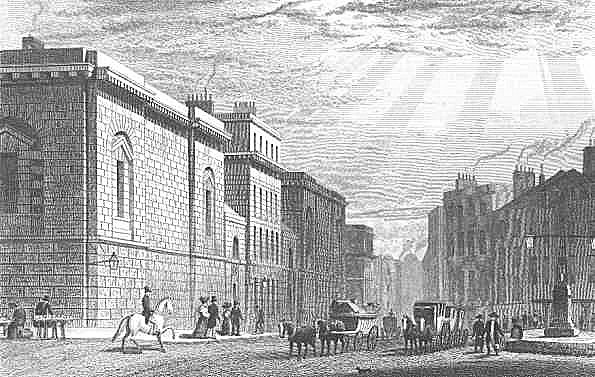 |
|
London's notorious
Newgate Prison, on the left,
looking towards Old Bailey. |
In reply, the Attorney-General said that the defence which had been made
by the defendant
confirmed the opinion he had originally expressed of the dangerous
description of ability which he
possessed.... The manner in which he had artfully read the exciting
extract from the American
paper, and omitted the comments upon it, giving the bane but omitting the
antidote, likewise
showed his dangerous ability for mischief, particularly as he expected
thereby to escape from
punishment. The Attorney-General praised The Times and most other papers
for the generous and
noble manner in the preservation of the public peace.
After summing up, the jury returned a verdict of Guilty. Bezer was
sentenced to be imprisoned in
the House of Correction [Newgate Prison] for two years, and to pay a fine
of £10.
AFTERMATH
Bezer was released in April 1850 upon recognisance in the sum of £100,
with two sureties of £50
each and to keep the peace and be of good behaviour for five years.
During 1849 Bezer and Shaw requested an increase in
light and fire, the use of pen, paper and ink, and an alteration in diet.
It was then considered that they were 'misconducting themselves' by
writing to and receiving letters from Chartists imbued with their
dangerous politics, and other refractory conduct. Their privileges
were suspended. Responding to a petition on their behalf, the
authorities stated that they were confined in a block of fifteen old cells
– not 'condemned' cells as was thought, and that Newgate had no 'condemned
cells' of that description. The petition was referred to the Gaol
Committee. Although Bezer probably found the conditions reasonably
tolerable, John Shaw, an undertaker by trade in Gloucester Street,
Commercial Road, had been used to better things. In a letter from
his No. 8 Cell at Newgate to George Julian Harney, he had complained about
his gout, the cold, and his damp linen (there being no fire).
|
Newgate Prison, 1850.
From the London Illustrated News. |
|
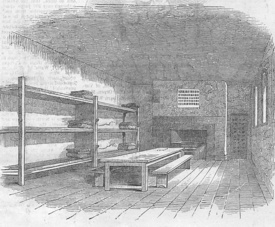 |
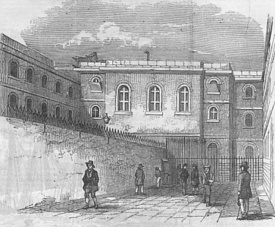 |
|
Ward for
condemned male prisoners. |
The
Chapel-yard. |
|
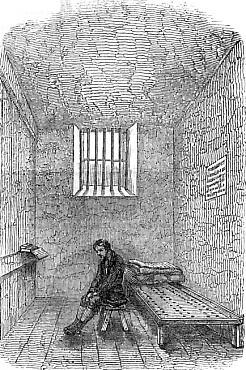 |
|
Punishment
cell. |
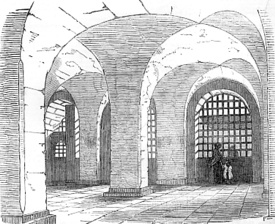 |
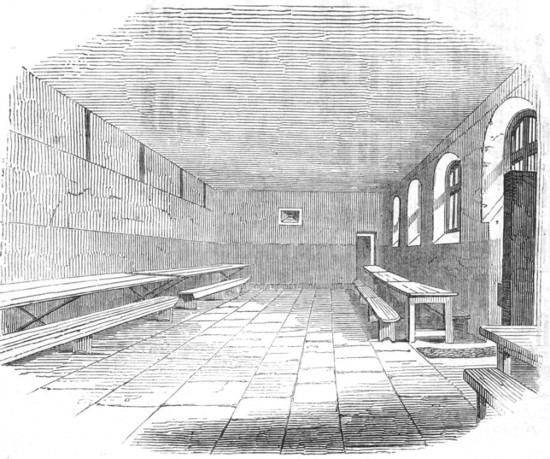 |
|
Corridor. |
A Dining Ward. |
On April 22, 1850, a large meeting was convened at the South London Chartist
Hall, Webber Street,
Southwark, under the auspices of the National Charter Association. During
this meeting the
recently released Chartists were welcomed to the platform amidst cheering. Bezer addressed the
meeting, saying that he was a most grateful man, the Whigs had been very
very kind to him, and
he exhibited his gratitude by attending the very first Chartist meeting
after his liberation.
(Laughter.) His eighty-six weeks' confinement had not reformed him, except
it had changed his
mind a little; when he went to prison he thought his principles were
right, but now he was sure
they were. (Cheers.)
A brother radical had met him coming to the meeting, and shook him
cordially by the hand, and
asked him did he mean to cause the meeting to laugh? He hoped the meeting
would remember
that, although eighty-six weeks' incarceration had not broken his heart,
yet he could not conceive
that Newgate's sombre walls were calculated to enliven his spirits or make
him gay - (Hear-hear.) -
more especially when he remembered he had left their honest uncompromising
friend (John Shaw)
immured within its walls. He had heard too, (what should he, as a loyal
man call them,) wicked
speeches. He was not a learned man, although he had been called to the bar
- (laughter) - and
when there, his learned brother, her Majesty's Attorney-General, had said,
pointing to him (Mr.
Bezer,) "The prisoner has positively offered to sell Lord John Russell a
pike - a pike, yes
gentlemen, a pike." (Roars of laughter.)
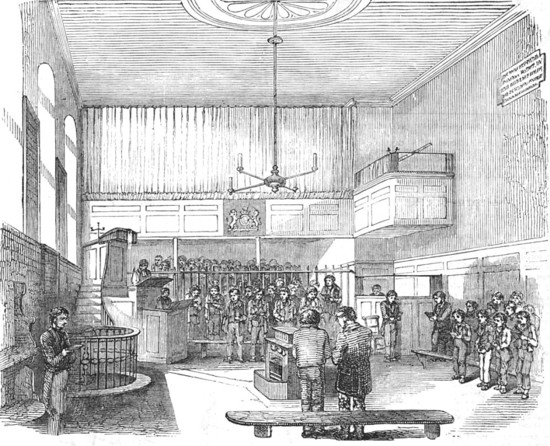 |
|
Newgate prison Chapel, 1850.
From the London Illustrated News. |
Ah, it was easy for them to laugh, but allow him to say it put all the old
ladies in court into a state
of "Terroris extremis." (Increased laughter.) Well, he had told them that
he was not a learned man,
but he had searched Johnson, Entick, and others, and had there found that
a pike was a fish, and
of course, by a parity of reasoning, a fish was a pike. (Laughter.) Well,
as they all knew he was a
City merchant, he dealt in fish, and, of course, merchant-like, wished to
have the patronage of the
first Minister of the Crown; but instead of giving him (Mr. Bezer) an
order for the pike, he had given
him an order for the "Stone Jug." (Laughter and applause.) ["Stone Jug"
slang for a prison cell.
Ed.] When there he had been visited by the magistrates; one in particular
said: "Oh, you are
Bezer - you are a fool - I don't pity you - you not only get yourself into
trouble, but you endeavour
to get others into trouble by your talk. Ah, t'was lucky for you that you
did not attempt to march
from Kennington Common, for I suppose you were there, or you would all
have been annihilated,
for I had command of the bridges; one did come roaring out, I am a
Chartist - brandishing his stick
- I took it from him and threw it into the water; can I do anything for
you?" Yes, he wished to see
his wife - "for what reason?" Because he was a husband and father. (Loud
cheers.) "Oh! that's no
reason." Four times had this "Commander of Bridges" visited him and
repeated the same tale; but
he hoped the meeting would not think the "Commander" was Mr. Alderman
Farebrother. (Loud
laughter.)...
Mr. Bezer then called for three cheers for John Shaw, which were heartily
given, and resumed his
seat greatly applauded.
|
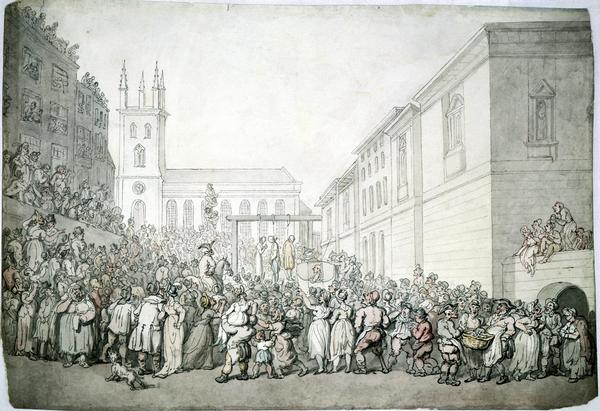 |
|
Public hangings outside Newgate
Prison (now the site of the Old Bailey).
Public hangings drew large crowds until they were
discontinued in 1868.
'Townsend, the noted Bow Street runner,
giving evidence before a Committee of the House of Commons in 1816,
testified to these grim facts:—"We never had an execution wherein we
did not grace that unfortunate gibbet at the Old Bailey with less
than ten, twelve, sixteen, or twenty wretches—I may say forty, for
in the year 1783, when Serjeant Adair was Recorder, there were forty
hanged at two executions." The gaoler of Newgate, being asked
by the Recorder a few years later how many could be executed at one
time on a new gallows, complacently replied: "Well your worship, we
can hang twelve upon a stretch, but we can't hang more than ten
comfortably."'
W. E. ADAMS,
'Memoirs of a Social Atom'. |
On the following day, April 23, a meeting was held at the John Street
Institution on behalf of the
Chartists who were still imprisoned. A number of notable Chartists
addressed the meeting,
including Bronterre O'Brien, G.W.M. Reynolds, George Julian Harney, Walter
Cooper, Gerald
Massey and Bezer.
Bezer was greeted with a most rapturous welcome, and said that on the 28
July 1848, he was on
the platform of the Milton Street Institution, but on the same date in
1849 he had found himself in
quite a different place. And why? because he had spoken freely, and he
meant what he then said.
(Hear.) He recollected one sentence he had uttered to the government
reporters; it was - "They
were there, not because they feared the government, but because the
government feared the
uneducated costermonger," - (great cheering.) - and his saying had been
verified. When brother
Shaw got out he should have a tale to tell them. (Three cheers were called
for, and heartily given,
for John Shaw.) On the occasion some of his friends had advised him to go
out of the way, and he
had taken himself to Highgate; only five persons knew where he was, and
one of them had proved
a Judas, by selling the secret for sixty pieces of copper - yes, for five
shillings. (Hear, hear.) Well,
he was arrested, tried, as it was called, and convicted, of course; and
what was he charged with?
Why, conspiring against Her Majesty, her crown, and dignity. (Laughter.) Now, really, he had
never mentioned the little lady's name; but he had told the people, they -
the producers of wealth -
were responsible. Of course this was seditious - truth and sedition being
synonymous terms.
(Loud cheers.) Well, he was now out of prison, in mind and principle a
wiser man than when he
went in, - (cheers) - and to use a lady's expression - "He was as well as
could be expected," -
(laughter) - and so he ought to be, considering that in eighty-six weeks
he had swallowed, upon a
fair computation, three hogsheads of skilly. (Laughter.) [Some 165 gallons
of gruel. Ed.] Well, it
appeared that Popes ran away, Kings had their whiskers shaved off, -
(laughter) - and stand ye
firm, for the poet has written:
|
"Mitres and Thrones from this world shall be hurled
And Peace and Brotherhood through the universe prevail." |
________________ |
|
THE PRISONER'S PRAYER.
Bezer was quite
religious, was baptised at the age of 16, and attended a non-conformist
chapel regularly where, according to his autobiography he progressed to
instructing. Later he became a Dissenter—one who refuses to conform to the
doctrines of the established church.
From the Christian
Socialist, 1850.
(Written in one of the Condemned Cells of Newgate.)
"Let the sighing of the prisoner come before Thee."
Psalm 79-2 |
|
God, everlasting great Creator, One
Whose ways mysterious are, past finding out,
Yet earth and air, and sea, and the bright sun,
And all creation's works, prove beyond doubt,
Unvarying beneficence and love,—
Permit, O Lord, a weak and bruised reed
To praise Thy glorious name for mercies past,
And pray for aid in all his future need;
Help him, on Thee his every care to cast,
And look to Thee alone—Father above!
Lord I have sinn'd—sinn'd deeply—from my
youth
Spirit and flesh have battled long and sore,
And flesh have often conquered—of a truth
I can do nothing in this ceaseless war—
In me (that is, my flesh) dwells no
good
thing,
But in Thine own revealed I will read,
That Thou wilt e'en forgive the vile, the base:
In mercy Thou delightest, and I plead
Thy promises of pardon and of grace,
To Thee a
broken contrite heart I bring.
Thy chastening hand is on me:—Shepherd spare
Thy poor wandering sheep! Thy stripes are
light
Compared to those I merit, yet forbear
Compassionate Creator! Let the night
Be short, and morning soon again
appear!
Open the prison doors and set me free!
Yet thou must pardon if I ask amiss,
For I am weak and tempted; let me be
Resigned, and humbly learn the rod to kiss,
Whate'er thy will, oh give me
strength to
bear!
And when our toils and cares on earth are o'er,
O may we meet in the broad realms above,
And with our friends and dear ones gone before,
Join in the thrilling chorus "God is love"
Around the great white throne, and part no more.
No prison bars or bolts, no night is there,
No anguish and no sin—all, all is joy—
Prepare us for that blissful change, prepare-
All earthly, vain, and sensual thoughts destroy,
And make us meet to drink that fountain pure.
Bless all Thy ministering servants, bless,
Whate'er their creed, (to me 'tis all the same
So that they work for Thee in faithfulness,
And not for Mammon, or for earthly fame);
With grace and wisdom every one endow'd;
Hasten the time when every one shall know Thy
name,
Virtue and truth shall conquer lies and vice,
Men follow Christ:—so peace on earth pro-
claim,
And make this glorious globe a paradise; -
'Tis only sin that mars its beauties now.
Show pity to the poor mistaken ones,
Victims of evil training;—pardon all
Within these walls, and let earth's favoured sons
Take careful heed, (or they too, may soon fall;)
Their weaker brethren educate and save.
Tyrants of every clime and age, beware!
The last tremendous sessions draweth near,
The great eternal magistrate is there;
Judges and criminals on earth appear,
The rich, the poor, the freeman, the slave!
Banish all malice from Thy servant's heart
Teach me to pray for those who do me ill,
Let each revengeful angry thought depart,
And even while they harm me love me still,
And though they smite, learn not to smite again.
My leader be Thy well-beloved Son—
The image of Thyself, the good, the great,
The sinner's friend, the meek, the lowly one,
Oh! may I ever love to imitate!
Give me the mind of Jesus Christ. Amen.
J. J. BEZER.
__________________
|
|
References:
'Autobiography of one of the Chartist Rebels of 1848.' Serialised in The
Christian Socialist, 1851,
but not completed due to The Christian Socialist being discontinued. Reprinted in
Testaments of
Radicalism. Edited by David Vincent. London, Europa, 1977.
The Times, 27 July 1848, p.8. John Shaw and Bezer at meeting.
Regina v. Bezer. Indictment. Central Criminal Court, August Sessions 1848.
(Treasury Solicitor and HM Procurator General. Papers TS 11/1119).
The Times, August 24, 1848, p.7. Account of prosecution of John Shaw.
The Times, August 29, 1848, p.7. Brief account of Bezer's trial together
with the other defendants,
Snell, Crowe, and Bryson.
The Times, April 20, 1850, p.7. Item on Bezer's release from prison.
The London Illustrated News, February 23, 1850, p.131; viz.
STATE OF NEWGATE.
The Northern Star and National Trades' Journal.
December 12, 1849, p.5. Bezer and Shaw in
Newgate. Conditions.
The Northern Star and National Trades' Journal. April 27, 1850, p.1. Meeting at South London
Chartist Hall following the release of the Chartists from prison. (See
also David Shaw's biography of Gerald Massey,
chapter 2.)
|
|